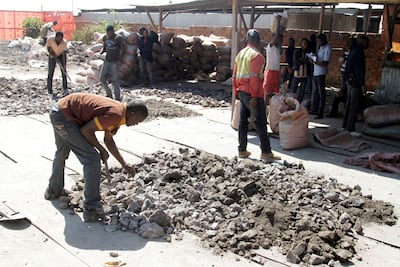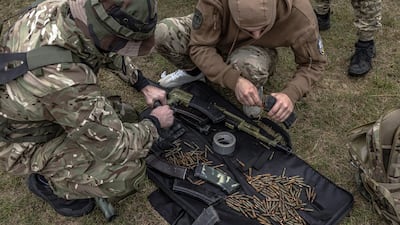Prioritising money to fund arms for Ukraine while reducing climate finance is a “huge mistake”, according to an African environmental activist.
The Cop26 summit in Glasgow was hailed as a breakthrough in the global fight against the warming of the planet as nations pledged trillions of dollars to efforts for a greener future.
But after Russia invaded Ukraine in February, governments in the West scrambled to supply weaponry to Kyiv and impose sanctions on Moscow.
The war in Europe has caused the landscape of addressing climate change to undergo a seismic shift, said Nisreen Elsaim, who believes that the urgent issue appears to have fallen off the agenda of some world leaders.
Ms Elsaim, who chairs the UN secretary general’s youth advisory group on climate change and also the Sudan Youth Organisation on Climate Change, called for an immediate rethink of priorities. Ahead of the Cop27 summit in Sharm El Sheikh, Egypt, in November, she urged the leaders of rich countries to either refrain from or do a U-turn on lowering the priority of climate finance, saying it is “pure stupidity”.
“The G7 countries and the G20 countries made it very clear: they promised trillions,” she said.
“In Glasgow the language on finance was not billions, it was trillions. But this was before Ukraine. Suddenly, after the Ukrainian [invasion] the language disappeared and they were not hiding it. They said very clearly ‘we have a situation now, Ukraine will need a lot of money and a lot of support'.”
“Of course climate finance will be impacted and this is a huge mistake because while the Ukrainian war is happening, climate change is also happening,” she said. “Climate change doesn’t stop just because there’s a war here or there’s a conflict there.”
In a bid to hammer home the gravity of the task at hand, Ms Elsaim said that putting climate finance down the list of priorities “because of new things that came up is for me pure stupidity”.
She was speaking at a panel discussion held by British think tank Chatham House to coincide with International Peace Day.
The huge floods that recently devastated Pakistan are just one example of how the international community is facing threats on a frightening scale.
Ms Elsaim said as well as governments shoring up money to tackle climate change, “polluters must pay” too.
Blaise Muhire, from the Democratic Republic of Congo, spoke of the implications of cobalt mining in the central African nation. He said while the international community moves away from fossil fuels and shifts towards green energy, little thought is being given to conflicts that may arise along the way.
“This shift at the international level will possibly produce rapid changes in the country,” he said. “Unfortunately, very little attention is being paid to conflict analytics and security in the global supply chain.”
More than 70 per cent of the world’s cobalt is mined in the DRC and child labour is endemic in the industry. Up to 40,000 children, some as young as six, are estimated to work in the cobalt mines.
Cobalt is used in the making of lithium-ion batteries that power electric vehicles.

As economies around the world transition towards a more eco-friendly system, demand for electric vehicles is on the rise, thus fuelling a higher need for cobalt.
Mr Muhire said as more and more people move into areas around mines in the DRC, the risk of conflict and tension rises as host communities are not always welcoming to outsiders seeking employment.
“Even through social media it’s like a hate speech going on because there’s this rush of people who are looking for opportunities,” he said.


